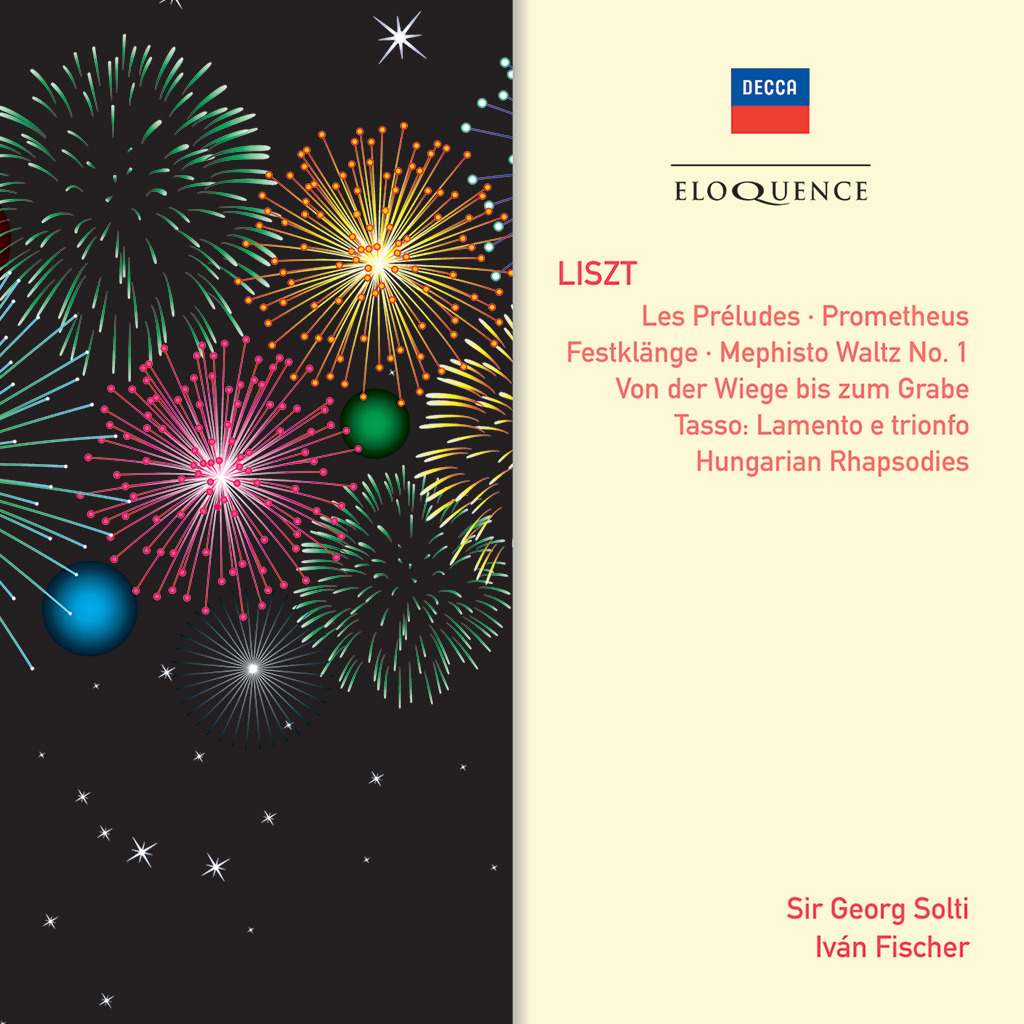
Having made revolutionary changes during the 1830s and 40s, in both piano performance and composition, Liszt was hardly less innovative in his relationship with the orchestra. He is generally credited with having created the genre of the symphonic poem, in which a narrative or extra-musical idea is depicted within a structural framework usually associated with an abstract symphonic movement. In 1974 and 1977, Sir Georg Solti recorded five of the composer’s Tone Poems as well as the Mephisto Waltz No. 1 with the London Philharmonic and the Orchestre de Paris. With fabled ‘Decca Sound’, these recordings have been much sought after by collectors. Recently reissued in the (limited) Liszt Edition, they are now made available generally as a 2CD set.
The coupling is a much-praised version of the Liszt Hungarian Rhapsodies, in orchestrations by both the composer as well as Doppler, by Iván Fischer, considered one of the most important conductors of our time. The interpretations were unforgettably described by Gramophone, on their first appearance, as ‘frisky as foals and as flavoursome as goulash’. Even though he grew up in a family in which German was spoken, and although he left Hungary at a young age, Liszt regarded himself as a Hungarian, and he took considerable pride in that fact. Nevertheless, Liszt and Hungary did not always understand each other. He promoted the idea that Hungary’s true national music was the music of the Gypsies, not realising that many of the melodies played by Gypsy bands were in fact composed (but not written down) by Hungarian landowners whose families did not appreciate Liszt’s mis-attributions – particularly because the Gypsies were not highly regarded in Hungary. This, however, does nothing to diminish the popularity of the Hungarian Rhapsodies, six of which were orchestrated in conjunction with Franz Doppler, a flute virtuoso and a composer in his own right who met Liszt in 1854 and began orchestrating several of his rhapsodies three years later.
LISZT
CD1
Les Préludes
Prometheus
Festklänge
London Philharmonic Orchestra
Sir Georg Solti
Von der Wiege bis zum Grabe · Mephisto Waltz No. 1
CD 2
Tasso: Lamento e trionfo
Orchestra de Paris
Sir Georg Solti
Hungarian Rhapsodies Nos. 1-6
Budapest Festival Orchestra
Iván Fischer
Recording Producers: James Mallinson (Tasso, Mephisto Waltz No. 1, Von der Wiege bis zum Grabe, Les Préludes, Festklänge, Prometheus); Hein Dekker, Hermine Sterringa (Hungarian Rhapsodies)
Balance Engineers: Kenneth Wilkinson, James Lock, John Dunkerley (Tasso, Mephisto Waltz No. 1, Von der Wiege bis zum Grabe); Kenneth Wilkinson, Martin Atkinson (Prometheus, Les Préludes, Festklänge); Carl Schuurbiers, Rico Yntema (Hungarian Rhapsodies)
Recording Locations: Salle Wagram, Paris, France, May/June 1974 (Tasso, Mephisto Waltz No. 1, Von der Wiege bis zum Grabe); Kingsway Hall, London, UK, April 1977 (Les Préludes, Festklänge), June 1977 (Prometheus); Italian Institute, Budapest, Hungary, March 1997 (Hungarian Rhapsodies)
‘Solti and Liszt are handsomely matched’ Gramophone
“wildly fiery, pressing things to their utmost limit when the music seems to warrant that, yet not at all without response to the more romantic episodes. [Solti] also has the power to make an orchestra sound like the best in the world and the Orchestre de Paris — this is his first recording with them—play as I have never heard them play before. The Mephisto Waltz No. 1 is given for all it is worth… This is a stunning performance. … this is certainly a very exciting record and I commend it without reservation.” [Solti] Gramophone
“Fischer’s idiomatic foray into this well-worn repertoire is distinguished by tonal lustre and high spirits … Charm is in generous supply everywhere … There is plenty of power, too, with meaty brass and growling crescendos at the start of No. 4, and a riot of colour to close No. 6. Fischer’s Hungarian Rhapsodies are as frisky as foals and as flavoursome as goulash, and are further aided by excellent, full-bodied sound … as dashing and as dancing as anyone might want. Strongly recommended.” [Fischer] Gramophone
